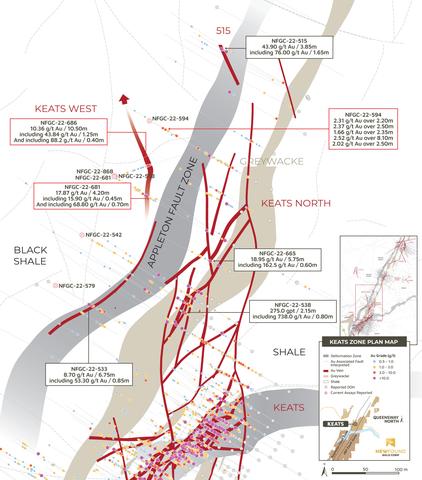New Found Discovers New High-Grade Gold Zone West of the Appleton Fault Intercepting 10.4 g/t Au Over 10.5m & 17.9 g/t Au Over 4.2m at “Keats West”

Figure 1.
Keats West Highlights:
Hole No. |
From (m) |
To (m) |
Interval (m)1 |
Au (g/t) |
Prospect |
NFGC-22-681 |
116.80 |
121.00 |
4.20 |
17.87 |
|
Including |
116.80 |
117.25 |
0.45 |
15.90 |
|
And including |
120.30 |
121.00 |
0.70 |
68.80 |
|
NFGC-22-686 |
100.50 |
111.00 |
10.50 |
10.36 |
|
Including |
101.30 |
102.55 |
1.25 |
43.84 |
|
And including |
103.05 |
103.45 |
0.40 |
88.20 |
Table 1: Keats West Drilling Highlights
1Note that the host structures are interpreted to be steeply dipping and true widths are unknown at this time. Infill veining in secondary structures with multiple orientations crosscutting the primary host structures are commonly observed in drill core which could result in additional uncertainty in true width. Composite intervals reported carry a minimum weighted average of 1 g/t Au diluted over a minimum core length of 2m with a maximum of 2m consecutive dilution. Included high-grade intercepts are reported as any consecutive interval with grades greater than 10 g/t Au. Grades have not been capped in the averaging and intervals are reported as drill thickness.
- A new, near-surface high-grade gold discovery called “Keats West” has been made west of the AFZ, with intercepts including 17.87 g/t Au over 4.20m in NFGC-22-681 and 10.36 g/t Au over 10.50m in NFGC-22-686, (see Figures 1 and 3). These two intercepts are located approximately 50m apart along strike within an extensive brittle fault zone that has now been intersected over a strike length of approximately 120m and to a vertical depth of approximately 100m by four holes released today. Based on current modelling, this new structure strikes to the northwest, dips moderately to the southwest, and is open in all directions.
-
The discovery of high-grade gold west of the AFZ is a recent and exciting development, starting with the intercept of 8.70 g/t Au over 6.75m in NFGC-22-533, announced on
May 4, 2022 . Up to this point, drilling was focused entirely on the east side of the AFZ, which is host to Keats,Keats North , Golden Joint, and Lotto (see Figure 3). This recent discovery of similar high-grade gold mineralization now opens up a new 9.45km target corridor along the west side of the AFZ at Queensway North. -
Keats West is located northwest of Keats and along strike of the recent discoveries made at Keats North. The intensity of veining and size of the structural zone found at Keats West displays similar characteristics to the epizonal-style veining found on the east side of the fault, particularly atKeats Main Zone . Several drillholes into this new zone are pending assays with ongoing drilling focused on expanding theKeats West Zone .
Drillhole Details
Hole No. |
From (m) |
To (m) |
Interval (m)1 |
Au (g/t) |
Zone |
NFGC-22-542 |
35.45 |
38.00 |
2.55 |
2.06 |
|
NFGC-22-558 |
56.55 |
58.55 |
2.00 |
1.03 |
|
And |
96.00 |
98.20 |
2.20 |
1.19 |
|
NFGC-22-579 |
109.00 |
111.00 |
2.00 |
1.43 |
|
And |
118.05 |
120.65 |
2.60 |
1.44 |
|
NFGC-22-594 |
32.00 |
34.20 |
2.20 |
2.31 |
|
And |
38.50 |
41.00 |
2.50 |
2.37 |
|
And |
45.60 |
47.95 |
2.35 |
1.66 |
|
And |
60.00 |
68.10 |
8.10 |
2.52 |
|
And |
121.10 |
123.60 |
2.50 |
2.02 |
|
NFGC-22-681 |
116.80 |
121.00 |
4.20 |
17.87 |
|
Including |
116.80 |
117.25 |
0.45 |
15.90 |
|
And including |
120.30 |
121.00 |
0.70 |
68.80 |
|
NFGC-22-686 |
100.50 |
111.00 |
10.50 |
10.36 |
|
Including |
101.30 |
102.55 |
1.25 |
43.84 |
|
And including |
103.05 |
103.45 |
0.40 |
88.20 |
Table 2: Summary of composite results reported in this press release for
1Note that the host structures are interpreted to be steeply dipping and true widths are unknown at this time. Infill veining in secondary structures with multiple orientations crosscutting the primary host structures are commonly observed in drill core which could result in additional uncertainty in true width. Composite intervals reported carry a minimum weighted average of 1 g/t Au diluted over a minimum core length of 2m with a maximum of 2m consecutive dilution. Included high-grade intercepts are reported as any consecutive interval with grades greater than 10 g/t Au. Grades have not been capped in the averaging and intervals are reported as drill thickness.
Hole No. |
Azimuth (°) |
Dip (°) |
Length (m) |
UTM E |
UTM N |
NFGC-22-542 |
120 |
-45 |
296 |
658003 |
5427818 |
NFGC-22-558 |
120 |
-45 |
281 |
658053 |
5427904 |
NFGC-22-579 |
120 |
-45 |
200 |
657963 |
5427741 |
NFGC-22-594 |
120 |
-45 |
263 |
658104 |
5427990 |
NFGC-22-681 |
120 |
-63 |
131 |
658053 |
5427905 |
NFGC-22-686 |
70 |
-60 |
206 |
658053 |
5427905 |
Table 3: Details of drill holes reported in this press release
Queensway 400,000m Drill Program Update
Approximately
Sampling, Sub-sampling, Laboratory and Discussion
True widths of the intercepts reported in this press release have yet to be determined and further exploration is required. Infill veining in secondary structures with multiple orientations crosscutting the primary host structures are commonly observed in drill core which could result in additional variability in true width. Assays are uncut, and composite intervals are calculated using a minimum weighted average of 1 g/t Au diluted over a minimum core length of 2m with a maximum of 2m consecutive dilution. Included high-grade intercepts are reported as any consecutive interval with grades greater than 10 g/t Au.
All drilling recovers HQ core. Drill core is split in half using a diamond saw or a hydraulic splitter for rare intersections with incompetent core.
A professional geologist examines the drill core and marks out the intervals to be sampled and the cutting line. Sample lengths are mostly 1.0 meter and adjusted to respect lithological and/or mineralogical contacts and isolate narrow (<1.0m) veins or other structures that may yield higher grades. Once all sample intervals have been chosen, photos of the wet and dry core are taken for future reference.
Technicians saw the core along the defined cut-line. One-half of the core is kept as a witness sample and the other half is submitted for crushing, pulverizing, and assaying. Individual sample bags are sealed and placed into shipping pails and/or nylon shipping bags, sealed and marked with the contents.
Drill core samples are shipped to
The entire sample is crushed to approximately
Samples that have VG identified or fall within a mineralized interval are automatically submitted for screened metallic assay for gold.
All sample pulps are also analyzed for a multi-element ICP package (ALS method code ICP61).
Drill program design, Quality Assurance/Quality Control and interpretation of results are performed by qualified persons employing a rigorous Quality Assurance/Quality Control program consistent with industry best practices. Standards and blanks account for a minimum of
Quality Control data are evaluated on receipt from the laboratories for failures. Appropriate action is taken if assay results for standards and blanks fall outside allowed tolerances. All results stated have passed New Found’s quality control protocols.
New Found’s quality control program also includes submission of the second half of the core for approximately
The Company does not recognize any factors of drilling, sampling or recovery that could materially affect the accuracy or reliability of the assay data disclosed.
The assay data disclosed in this news release have been verified by the Company’s Qualified Person against the original assay certificates.
The Company notes that it has not completed any economic evaluations of its
Qualified Person
The scientific and technical information disclosed in this press release was reviewed and approved by
About
New Found holds a
Please see the Company’s website at www.newfoundgold.ca and the Company’s SEDAR profile at www.sedar.com.
Acknowledgements
New Found acknowledges the financial support of the
Contact
To contact the Company, please visit the Company’s website, www.newfoundgold.ca and make your request through our investor inquiry form. Our management has a pledge to be in touch with any investor inquiries within 24 hours.
Neither the
Forward-Looking Statement Cautions
This press release contains certain "forward-looking statements" within the meaning of Canadian securities legislation, relating to exploration, drilling and mineralization on the Company’s Queensway gold project in
View source version on businesswire.com: https://www.businesswire.com/news/home/20220927005513/en/
Per: "Collin Kettell"
Email: ckettell@newfoundgold.ca
Phone: +1 (845) 535-1486
Source:







